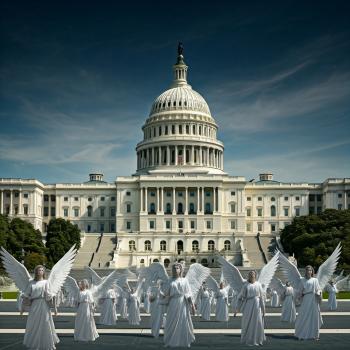John Quiggin: “Keeping the state out of your bedroom”
If you really want personal freedom, you can achieve it only by constraining property rights.
Dahlia Lithwick: “Occupy the No-Spin Zone”
I spent time this weekend at Occupy Wall Street and my husband spent much of last week adding his voice to the protesters there. I saw an incredible array of people that defy any simple demographic characterization and a broad range of signs that made — imagine! — more than a single point. But if I may hazard an opinion, it would be this: One of the most fatuous themes of mainstream OWS coverage is the endless loop of media bafflement at this movement that doesn’t have a message. … It takes a walloping amount of willful cluelessness to look at a mass of people holding up signs and claim that they have no message.
Richard Beck: “‘Biblical’ as a Sociological Stress Test”
Strictly from an empirical standpoint, the bible doesn’t produce homogeneity of opinion. Rather, it produces heterogeneity of opinion. That is a fact. The bible does not produce consensus. And if you think that it could or should you’re just not a serious person.
The point being, a conversation seeking to find a “biblical” view isn’t heading toward a fixed destination. Rather, such a conversation will be airing a diversity of views that share a family resemblance. …
Biblical definitely doesn’t describe the attempt to conform to or recreate the church we find in the pages of the bible. I know of no denomination that looks like the church revealed in the New Testament. Can you point me to one?
And if we can’t what does that say about how we are using the word biblical? Suddenly it’s very clear that biblical doesn’t mean “doing what they did in the bible.” Because no one is doing that. …
This is what I think it means. Biblical is a word Christian communities use to describe their hermeneutical strategies. … When a faith community gathers to discuss if a view is biblical or not they are asking how a particular view sits with their hermeneutical history and norms. The issue isn’t if a position is biblical or not (because, as I noted above, no one is being biblical) but if a position would cause a sociological rupture, a tear in the hermeneutical fabric that has held this community together. If the position can be woven into the hermeneutical web then it is declared biblical. But if the rupture is too great then the view is declared unbiblical.
In summary, this is my definition of biblical: Biblical is a sociological stress test.
Paul Krugman: “Denial in Depth”
You have various right-wingers simultaneously (a) denying that global warming is happening (b) denying that anyone denies that global warming is happening, but denying that humans are responsible (c) denying that anyone denies that humans are causing global warming, insisting that the real argument is about the appropriate response.
I’m not sure there are three levels (yet) on inequality, but we definitely have (a) right-wingers denying that inequality is rising and (b) denying that anyone is denying the rise in inequality, but attacking any proposal to limit that rise.
You might ask, how is it possible to take such mutually contradictory positions? And the answer is, it’s very easy if confusing the debate is your job.
Mark Thoma: “When It Reigns, It Poors”
Somehow, it is claimed, after workers have lost power in wage negotiations, lost social insurance and other protections, live in more polluted environments, have fewer health care options, and are more likely to be asked to bail out deregulated banks yet again while getting no help themselves, they will be better off.
Jonah Lehrer: “How Friends Ruin Memory: The Social Conformity Effect” (via)
The reason we’re such consummate bullshitters is simple: we bullshit for each other. We tweak our stories so that they become better stories. We bend the facts so that the facts appeal to the group. Because we are social animals, our memory of the past is constantly being revised to fit social pressures.
… Feedback of others has the ability to strongly shape our remembered experience. We are all performers, twisting our stories for strangers.
Pam Hogeweide: “God, Occupied”
Like many Christians, I have prayed and fasted for revival to come to America. I have cried out to God more times than I can count for a spirit of repentance to visit our land. I never imagined it would look this way. The revival of my prayers I imagined was behind the four walls of steepled buildings, packed pews of the contrite with heads hung low, weeping guilt-driven prayers for sins to be washed away. I did not envision grandmothers, baristas, hippies and hipsters taking to the city streets to decry the sins of the nation.
Peter Dorman: “What Should OWS Demand?”
We don’t need new ideas to fix the economy. The policy obsessed debate the details, but the main contours in debt writedowns, regulation, public investment and related domains are well understood. The problem is that what is good for the economy is generally not profitable for the rich, and vice versa. Because of the gross imbalance of power in this country, we are unable to do what needs to be done.














